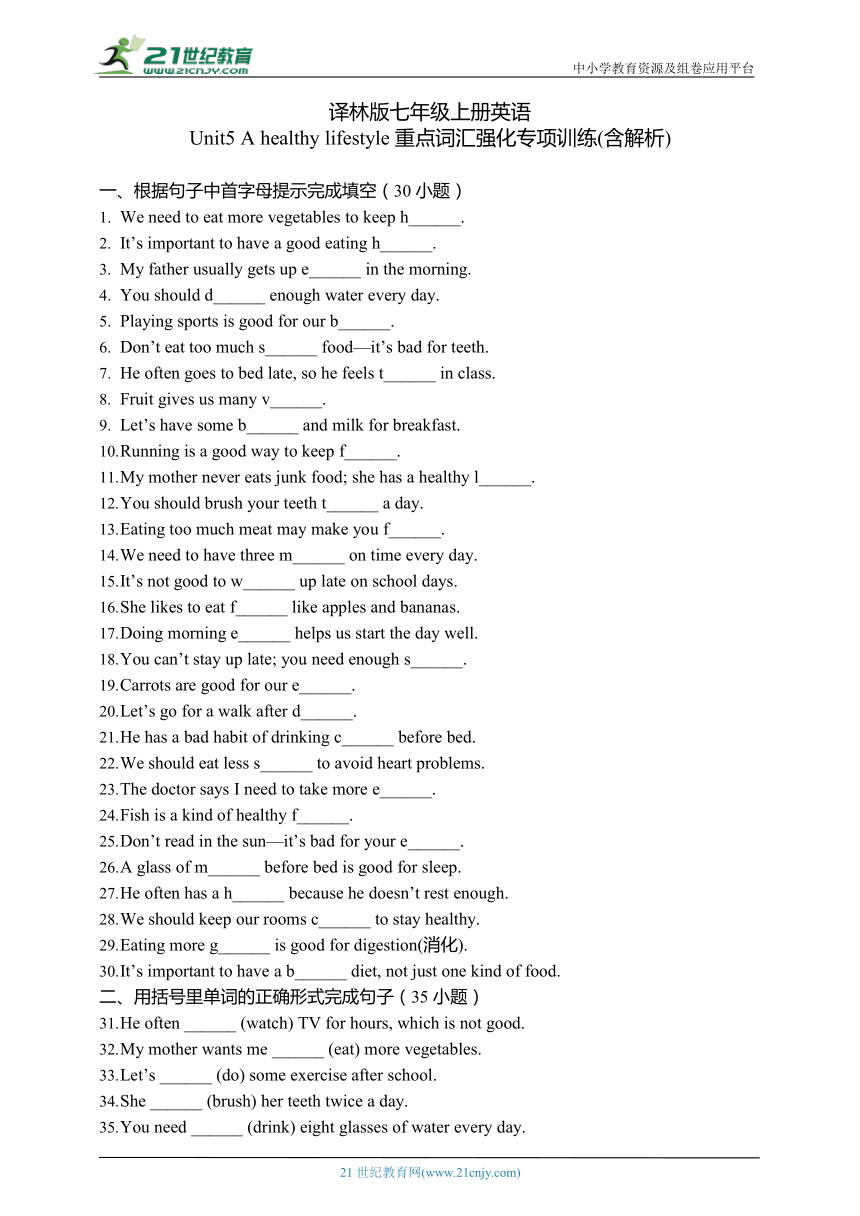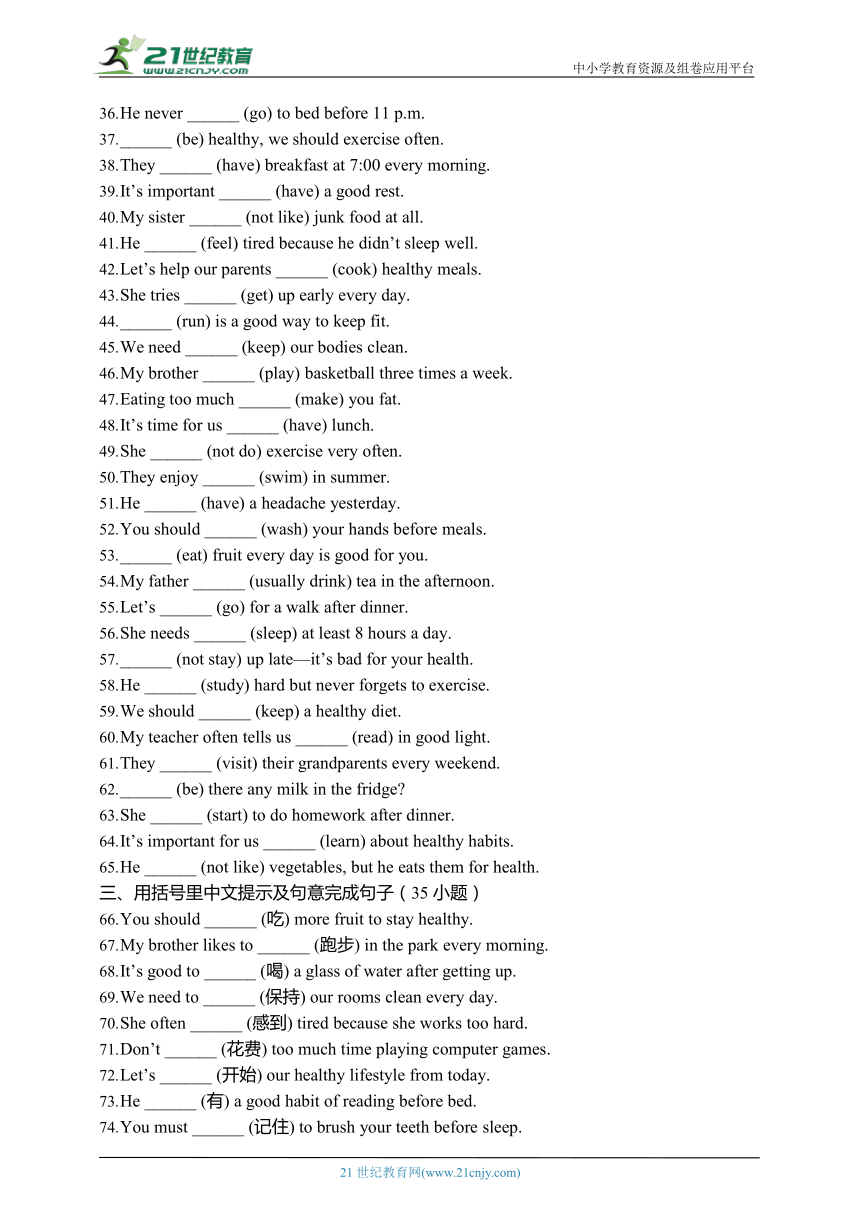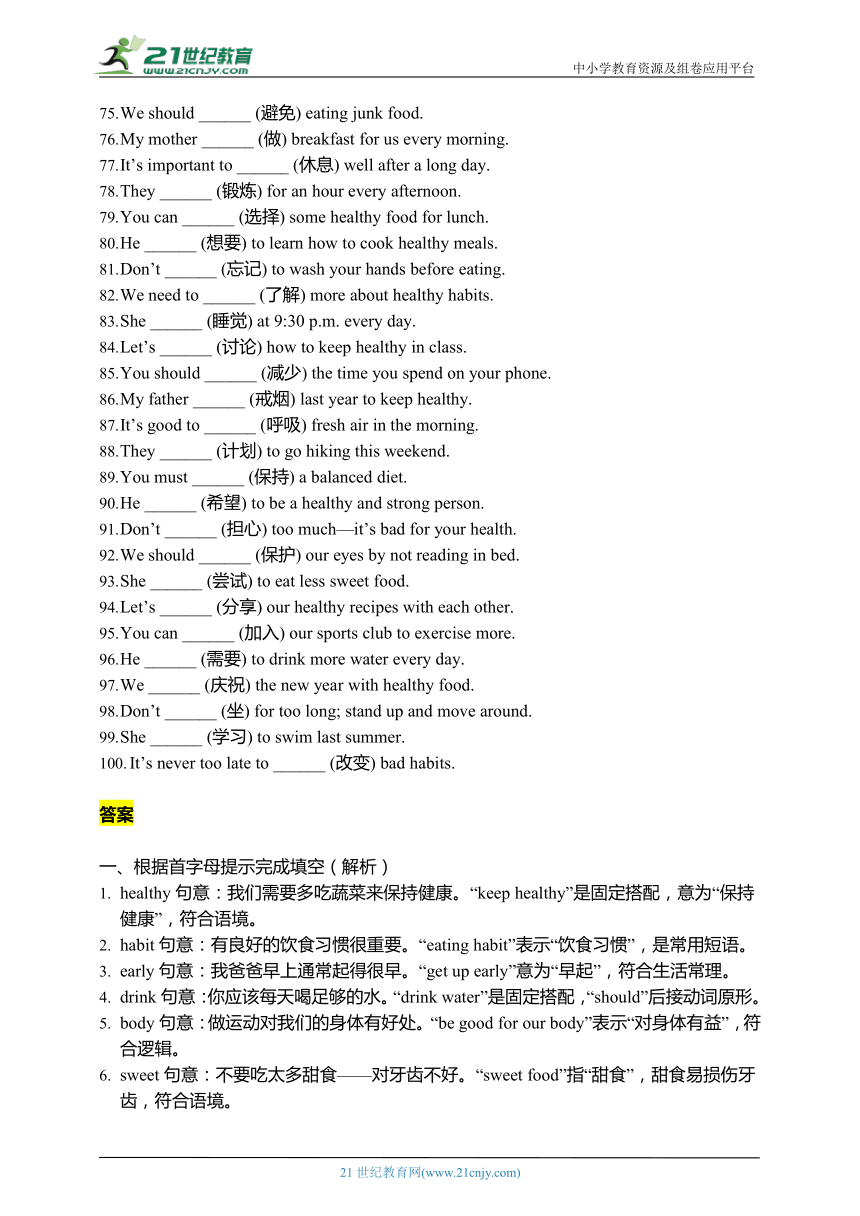Unit5 A healthy lifestyle重点词汇强化专项训练(含答案解析)译林版七年级上册英语
文档属性
| 名称 | Unit5 A healthy lifestyle重点词汇强化专项训练(含答案解析)译林版七年级上册英语 |

|
|
| 格式 | docx | ||
| 文件大小 | 52.8KB | ||
| 资源类型 | 试卷 | ||
| 版本资源 | 译林版 | ||
| 科目 | 英语 | ||
| 更新时间 | 2025-07-30 00:00:00 | ||
图片预览



文档简介
中小学教育资源及组卷应用平台
译林版七年级上册英语
Unit5 A healthy lifestyle重点词汇强化专项训练(含解析)
一、根据句子中首字母提示完成填空(30小题)
We need to eat more vegetables to keep h______.
It’s important to have a good eating h______.
My father usually gets up e______ in the morning.
You should d______ enough water every day.
Playing sports is good for our b______.
Don’t eat too much s______ food—it’s bad for teeth.
He often goes to bed late, so he feels t______ in class.
Fruit gives us many v______.
Let’s have some b______ and milk for breakfast.
Running is a good way to keep f______.
My mother never eats junk food; she has a healthy l______.
You should brush your teeth t______ a day.
Eating too much meat may make you f______.
We need to have three m______ on time every day.
It’s not good to w______ up late on school days.
She likes to eat f______ like apples and bananas.
Doing morning e______ helps us start the day well.
You can’t stay up late; you need enough s______.
Carrots are good for our e______.
Let’s go for a walk after d______.
He has a bad habit of drinking c______ before bed.
We should eat less s______ to avoid heart problems.
The doctor says I need to take more e______.
Fish is a kind of healthy f______.
Don’t read in the sun—it’s bad for your e______.
A glass of m______ before bed is good for sleep.
He often has a h______ because he doesn’t rest enough.
We should keep our rooms c______ to stay healthy.
Eating more g______ is good for digestion(消化).
It’s important to have a b______ diet, not just one kind of food.
二、用括号里单词的正确形式完成句子(35小题)
He often ______ (watch) TV for hours, which is not good.
My mother wants me ______ (eat) more vegetables.
Let’s ______ (do) some exercise after school.
She ______ (brush) her teeth twice a day.
You need ______ (drink) eight glasses of water every day.
He never ______ (go) to bed before 11 p.m.
______ (be) healthy, we should exercise often.
They ______ (have) breakfast at 7:00 every morning.
It’s important ______ (have) a good rest.
My sister ______ (not like) junk food at all.
He ______ (feel) tired because he didn’t sleep well.
Let’s help our parents ______ (cook) healthy meals.
She tries ______ (get) up early every day.
______ (run) is a good way to keep fit.
We need ______ (keep) our bodies clean.
My brother ______ (play) basketball three times a week.
Eating too much ______ (make) you fat.
It’s time for us ______ (have) lunch.
She ______ (not do) exercise very often.
They enjoy ______ (swim) in summer.
He ______ (have) a headache yesterday.
You should ______ (wash) your hands before meals.
______ (eat) fruit every day is good for you.
My father ______ (usually drink) tea in the afternoon.
Let’s ______ (go) for a walk after dinner.
She needs ______ (sleep) at least 8 hours a day.
______ (not stay) up late—it’s bad for your health.
He ______ (study) hard but never forgets to exercise.
We should ______ (keep) a healthy diet.
My teacher often tells us ______ (read) in good light.
They ______ (visit) their grandparents every weekend.
______ (be) there any milk in the fridge
She ______ (start) to do homework after dinner.
It’s important for us ______ (learn) about healthy habits.
He ______ (not like) vegetables, but he eats them for health.
三、用括号里中文提示及句意完成句子(35小题)
You should ______ (吃) more fruit to stay healthy.
My brother likes to ______ (跑步) in the park every morning.
It’s good to ______ (喝) a glass of water after getting up.
We need to ______ (保持) our rooms clean every day.
She often ______ (感到) tired because she works too hard.
Don’t ______ (花费) too much time playing computer games.
Let’s ______ (开始) our healthy lifestyle from today.
He ______ (有) a good habit of reading before bed.
You must ______ (记住) to brush your teeth before sleep.
We should ______ (避免) eating junk food.
My mother ______ (做) breakfast for us every morning.
It’s important to ______ (休息) well after a long day.
They ______ (锻炼) for an hour every afternoon.
You can ______ (选择) some healthy food for lunch.
He ______ (想要) to learn how to cook healthy meals.
Don’t ______ (忘记) to wash your hands before eating.
We need to ______ (了解) more about healthy habits.
She ______ (睡觉) at 9:30 p.m. every day.
Let’s ______ (讨论) how to keep healthy in class.
You should ______ (减少) the time you spend on your phone.
My father ______ (戒烟) last year to keep healthy.
It’s good to ______ (呼吸) fresh air in the morning.
They ______ (计划) to go hiking this weekend.
You must ______ (保持) a balanced diet.
He ______ (希望) to be a healthy and strong person.
Don’t ______ (担心) too much—it’s bad for your health.
We should ______ (保护) our eyes by not reading in bed.
She ______ (尝试) to eat less sweet food.
Let’s ______ (分享) our healthy recipes with each other.
You can ______ (加入) our sports club to exercise more.
He ______ (需要) to drink more water every day.
We ______ (庆祝) the new year with healthy food.
Don’t ______ (坐) for too long; stand up and move around.
She ______ (学习) to swim last summer.
It’s never too late to ______ (改变) bad habits.
答案
一、根据首字母提示完成填空(解析)
healthy句意:我们需要多吃蔬菜来保持健康。“keep healthy”是固定搭配,意为“保持健康”,符合语境。
habit句意:有良好的饮食习惯很重要。“eating habit”表示“饮食习惯”,是常用短语。
early句意:我爸爸早上通常起得很早。“get up early”意为“早起”,符合生活常理。
drink句意:你应该每天喝足够的水。“drink water”是固定搭配,“should”后接动词原形。
body句意:做运动对我们的身体有好处。“be good for our body”表示“对身体有益”,符合逻辑。
sweet句意:不要吃太多甜食——对牙齿不好。“sweet food”指“甜食”,甜食易损伤牙齿,符合语境。
tired句意:他经常晚睡,所以在课堂上感到疲倦。“feel tired”意为“感到疲倦”,与“goes to bed late”呼应。
vitamins句意:水果给我们提供很多维生素。“vitamins”(维生素)是水果的重要营养成分。
bread句意:我们早餐吃些面包和牛奶吧。“bread”(面包)是常见早餐食物,与“milk”搭配合理。
fit句意:跑步是保持健康的好方法。“keep fit”是固定短语,意为“保持健康”。
lifestyle句意:我妈妈从不吃垃圾食品,她有健康的生活方式。“healthy lifestyle”表示“健康的生活方式”,符合语境。
twice句意:你应该每天刷两次牙。“twice a day”意为“一天两次”,是刷牙的常规频率。
fat句意:吃太多肉可能会让你变胖。“make you fat”表示“使你变胖”,符合常识。
meals句意:我们需要每天按时吃三顿饭。“three meals”指“三餐”,“meal”用复数形式。
wake句意:上学日晚起不好。“wake up”是固定短语,意为“醒来”,“to”后接动词原形。
fruit句意:她喜欢吃水果,比如苹果和香蕉。“fruit”(水果)是苹果、香蕉的总称。
exercises句意:做早操帮助我们很好地开始一天。“morning exercises”是固定搭配,意为“早操”,常用复数。
sleep句意:你不能熬夜,你需要足够的睡眠。“enough sleep”表示“足够的睡眠”,与“stay up late”对应。
eyes句意:胡萝卜对我们的眼睛有好处。胡萝卜富含维生素A,对眼睛有益,是常识。
dinner句意:晚饭后我们去散步吧。“after dinner”意为“晚饭后”,是散步的常见时间。
coffee句意:他有睡前喝咖啡的坏习惯。咖啡含有咖啡因,睡前喝影响睡眠,符合“bad habit”的描述。
salt句意:我们应该少吃盐以避免心脏问题。过量摄入盐对心脏有害,是健康常识。
exercise句意:医生说我需要多锻炼。“take more exercise”意为“多锻炼”,“exercise”此处为不可数名词。
food句意:鱼是一种健康的食物。“food”(食物)是鱼的类别属性。
eyes句意:不要在阳光下看书——对你的眼睛不好。阳光下看书损伤眼睛,符合语境。
milk句意:睡前一杯牛奶有助于睡眠。牛奶含助眠成分,是生活常识。
headache句意:他经常头痛,因为休息不够。“have a headache”是固定短语,意为“头痛”,与“doesn’t rest enough”呼应。
clean句意:我们应该保持房间干净以保持健康。“keep our rooms clean”表示“保持房间干净”,符合健康习惯。
grain句意:多吃谷物有助于消化。“grain”(谷物)富含膳食纤维,利于消化。
balanced句意:有均衡的饮食很重要,不只是一种食物。“balanced diet”意为“均衡饮食”,符合健康理念。
二、用括号里单词的正确形式完成句子(解析)
watches主语“he”是第三人称单数,“often”表明时态为一般现在时,动词“watch”用三单形式“watches”。
to eat“want sb. to do sth.”是固定搭配,意为“想要某人做某事”,故用“to eat”。
do“Let’s + 动词原形”是祈使句结构,意为“让我们做某事”,故用“do”。
brushes主语“she”是第三人称单数,“twice a day”表明时态为一般现在时,动词“brush”用三单形式“brushes”。
to drink“need to do sth.”是固定搭配,意为“需要做某事”,故用“to drink”。
goes主语“he”是第三人称单数,“never”表明时态为一般现在时,动词“go”用三单形式“goes”。
To be此处用动词不定式“To be”作目的状语,意为“为了保持健康”,句首首字母大写。
have主语“they”是复数,“every morning”表明时态为一般现在时,动词用原形“have”。
to have“It’s important to do sth.”是固定句型,意为“做某事很重要”,故用“to have”。
doesn’t like主语“my sister”是第三人称单数,时态为一般现在时,否定句用“doesn’t + 动词原形”,故用“doesn’t like”。
felt由“because he didn’t sleep well”可知时态为一般过去时,动词“feel”的过去式是“felt”。
cook“help sb. (to) do sth.”是固定搭配,意为“帮助某人做某事”,“to”可省略,故用“cook”。
to get“try to do sth.”是固定搭配,意为“努力做某事”,故用“to get”。
Running此处用动名词“Running”作主语,表示“跑步”这一动作,句首首字母大写。
to keep“need to do sth.”是固定搭配,意为“需要做某事”,故用“to keep”。
plays主语“my brother”是第三人称单数,“three times a week”表明时态为一般现在时,动词“play”用三单形式“plays”。
makes动名词短语“Eating too much”作主语,视为单数,时态为一般现在时,动词“make”用三单形式“makes”。
to have“It’s time for sb. to do sth.”是固定句型,意为“到某人做某事的时间了”,故用“to have”。
doesn’t do主语“she”是第三人称单数,时态为一般现在时,否定句用“doesn’t + 动词原形”,故用“doesn’t do”。
swimming“enjoy doing sth.”是固定搭配,意为“喜欢做某事”,故用“swimming”。
had时间状语“yesterday”表明时态为一般过去时,动词“have”的过去式是“had”。
wash“should + 动词原形”是固定结构,意为“应该做某事”,故用“wash”。
Eating此处用动名词“Eating”作主语,表“每天吃水果”这一行为,句首首字母大写。
usually drinks主语“my father”是第三人称单数,“usually”表明时态为一般现在时,动词“drink”用三单形式“drinks”。
go“Let’s + 动词原形”是祈使句结构,故用“go”。
to sleep“need to do sth.”是固定搭配,意为“需要做某事”,故用“to sleep”。
Don’t stay此处是祈使句的否定形式,用“Don’t + 动词原形”,意为“不要熬夜”,句首首字母大写。
studies主语“he”是第三人称单数,时态为一般现在时,动词“study”用三单形式“studies”。
keep“should + 动词原形”是固定结构,故用“keep”。
to read“tell sb. to do sth.”是固定搭配,意为“告诉某人做某事”,故用“to read”。
visit主语“they”是复数,“every weekend”表明时态为一般现在时,动词用原形“visit”。
Is此处是there be句型的一般疑问句,主语“milk”是不可数名词,be动词用“Is”,句首首字母大写。
starts主语“she”是第三人称单数,时态为一般现在时,动词“start”用三单形式“starts”。
to learn“It’s important for sb. to do sth.”是固定句型,意为“对某人来说做某事很重要”,故用“to learn”。
doesn’t like主语“he”是第三人称单数,时态为一般现在时,否定句用“doesn’t + 动词原形”,故用“doesn’t like”。
三、用括号里中文提示及句意完成句子(解析)
eat“吃”对应的英文是“eat”,“should + 动词原形”,故用“eat”。
run“跑步”对应的英文是“run”,“like to + 动词原形”,故用“run”。
drink“喝”对应的英文是“drink”,“It’s good to + 动词原形”,故用“drink”。
keep“保持”对应的英文是“keep”,“need to + 动词原形”,故用“keep”。
feels“感到”对应的英文是“feel”,主语“she”是第三人称单数,时态为一般现在时,用“feels”。
spend“花费”对应的英文是“spend”,“Don’t + 动词原形”,“spend time doing sth.”是固定搭配,故用“spend”。
start“开始”对应的英文是“start”,“Let’s + 动词原形”,故用“start”。
has“有”对应的英文是“have”,主语“he”是第三人称单数,时态为一般现在时,用“has”。
remember“记住”对应的英文是“remember”,“must + 动词原形”,故用“remember”。
avoid“避免”对应的英文是“avoid”,“should + 动词原形”,故用“avoid”。
cooks“做(饭)”对应的英文是“cook”,主语“my mother”是第三人称单数,时态为一般现在时,用“cooks”。
rest“休息”对应的英文是“rest”,“It’s important to + 动词原形”,故用“rest”。
exercise“锻炼”对应的英文是“exercise”,主语“they”是复数,时态为一般现在时,用“exercise”。
choose“选择”对应的英文是“choose”,“can + 动词原形”,故用“choose”。
wants“想要”对应的英文是“want”,主语“he”是第三人称单数,时态为一般现在时,用“wants”。
forget“忘记”对应的英文是“forget”,“Don’t + 动词原形”,故用“forget”。
learn“了解”对应的英文是“learn”,“need to + 动词原形”,故用“learn”。
sleeps“睡觉”对应的英文是“sleep”,主语“she”是第三人称单数,时态为一般现在时,用“sleeps”。
discuss“讨论”对应的英文是“discuss”,“Let’s + 动词原形”,故用“discuss”。
reduce“减少”对应的英文是“reduce”,“should + 动词原形”,故用“reduce”。
quit smoking“戒烟”对应的英文是“quit smoking”,时间状语“last year”表明时态为一般过去时,“quit”的过去式是“quit”,故用“quit smoking”。
breathe“呼吸”对应的英文是“breathe”,“It’s good to + 动词原形”,故用“breathe”。
plan“计划”对应的英文是“plan”,主语“they”是复数,时态为一般现在时,用“plan”。
keep“保持”对应的英文是“keep”,“must + 动词原形”,故用“keep”。
hopes“希望”对应的英文是“hope”,主语“he”是第三人称单数,时态为一般现在时,用“hopes”。
worry“担心”对应的英文是“worry”,“Don’t + 动词原形”,故用“worry”。
protect“保护”对应的英文是“protect”,“should + 动词原形”,故用“protect”。
tries“尝试”对应的英文是“try”,主语“she”是第三人称单数,时态为一般现在时,用“tries”。
share“分享”对应的英文是“share”,“Let’s + 动词原形”,故用“share”。
join“加入”对应的英文是“join”,“can + 动词原形”,故用“join”。
needs“需要”对应的英文是“need”,主语“he”是第三人称单数,时态为一般现在时,用“needs”。
celebrate“庆祝”对应的英文是“celebrate”,主语“we”是复数,时态为一般现在时,用“celebrate”。
sit“坐”对应的英文是“sit”,“Don’t + 动词原形”,故用“sit”。
learned“学习”对应的英文是“learn”,时间状语“last summer”表明时态为一般过去时,“learn”的过去式是“learned”,故用“learned”。
change“改变”对应的英文是“change”,“It’s never too late to + 动词原形”,故用“change”。
21世纪教育网 www.21cnjy.com 精品试卷·第 2 页 (共 2 页)
21世纪教育网(www.21cnjy.com)
译林版七年级上册英语
Unit5 A healthy lifestyle重点词汇强化专项训练(含解析)
一、根据句子中首字母提示完成填空(30小题)
We need to eat more vegetables to keep h______.
It’s important to have a good eating h______.
My father usually gets up e______ in the morning.
You should d______ enough water every day.
Playing sports is good for our b______.
Don’t eat too much s______ food—it’s bad for teeth.
He often goes to bed late, so he feels t______ in class.
Fruit gives us many v______.
Let’s have some b______ and milk for breakfast.
Running is a good way to keep f______.
My mother never eats junk food; she has a healthy l______.
You should brush your teeth t______ a day.
Eating too much meat may make you f______.
We need to have three m______ on time every day.
It’s not good to w______ up late on school days.
She likes to eat f______ like apples and bananas.
Doing morning e______ helps us start the day well.
You can’t stay up late; you need enough s______.
Carrots are good for our e______.
Let’s go for a walk after d______.
He has a bad habit of drinking c______ before bed.
We should eat less s______ to avoid heart problems.
The doctor says I need to take more e______.
Fish is a kind of healthy f______.
Don’t read in the sun—it’s bad for your e______.
A glass of m______ before bed is good for sleep.
He often has a h______ because he doesn’t rest enough.
We should keep our rooms c______ to stay healthy.
Eating more g______ is good for digestion(消化).
It’s important to have a b______ diet, not just one kind of food.
二、用括号里单词的正确形式完成句子(35小题)
He often ______ (watch) TV for hours, which is not good.
My mother wants me ______ (eat) more vegetables.
Let’s ______ (do) some exercise after school.
She ______ (brush) her teeth twice a day.
You need ______ (drink) eight glasses of water every day.
He never ______ (go) to bed before 11 p.m.
______ (be) healthy, we should exercise often.
They ______ (have) breakfast at 7:00 every morning.
It’s important ______ (have) a good rest.
My sister ______ (not like) junk food at all.
He ______ (feel) tired because he didn’t sleep well.
Let’s help our parents ______ (cook) healthy meals.
She tries ______ (get) up early every day.
______ (run) is a good way to keep fit.
We need ______ (keep) our bodies clean.
My brother ______ (play) basketball three times a week.
Eating too much ______ (make) you fat.
It’s time for us ______ (have) lunch.
She ______ (not do) exercise very often.
They enjoy ______ (swim) in summer.
He ______ (have) a headache yesterday.
You should ______ (wash) your hands before meals.
______ (eat) fruit every day is good for you.
My father ______ (usually drink) tea in the afternoon.
Let’s ______ (go) for a walk after dinner.
She needs ______ (sleep) at least 8 hours a day.
______ (not stay) up late—it’s bad for your health.
He ______ (study) hard but never forgets to exercise.
We should ______ (keep) a healthy diet.
My teacher often tells us ______ (read) in good light.
They ______ (visit) their grandparents every weekend.
______ (be) there any milk in the fridge
She ______ (start) to do homework after dinner.
It’s important for us ______ (learn) about healthy habits.
He ______ (not like) vegetables, but he eats them for health.
三、用括号里中文提示及句意完成句子(35小题)
You should ______ (吃) more fruit to stay healthy.
My brother likes to ______ (跑步) in the park every morning.
It’s good to ______ (喝) a glass of water after getting up.
We need to ______ (保持) our rooms clean every day.
She often ______ (感到) tired because she works too hard.
Don’t ______ (花费) too much time playing computer games.
Let’s ______ (开始) our healthy lifestyle from today.
He ______ (有) a good habit of reading before bed.
You must ______ (记住) to brush your teeth before sleep.
We should ______ (避免) eating junk food.
My mother ______ (做) breakfast for us every morning.
It’s important to ______ (休息) well after a long day.
They ______ (锻炼) for an hour every afternoon.
You can ______ (选择) some healthy food for lunch.
He ______ (想要) to learn how to cook healthy meals.
Don’t ______ (忘记) to wash your hands before eating.
We need to ______ (了解) more about healthy habits.
She ______ (睡觉) at 9:30 p.m. every day.
Let’s ______ (讨论) how to keep healthy in class.
You should ______ (减少) the time you spend on your phone.
My father ______ (戒烟) last year to keep healthy.
It’s good to ______ (呼吸) fresh air in the morning.
They ______ (计划) to go hiking this weekend.
You must ______ (保持) a balanced diet.
He ______ (希望) to be a healthy and strong person.
Don’t ______ (担心) too much—it’s bad for your health.
We should ______ (保护) our eyes by not reading in bed.
She ______ (尝试) to eat less sweet food.
Let’s ______ (分享) our healthy recipes with each other.
You can ______ (加入) our sports club to exercise more.
He ______ (需要) to drink more water every day.
We ______ (庆祝) the new year with healthy food.
Don’t ______ (坐) for too long; stand up and move around.
She ______ (学习) to swim last summer.
It’s never too late to ______ (改变) bad habits.
答案
一、根据首字母提示完成填空(解析)
healthy句意:我们需要多吃蔬菜来保持健康。“keep healthy”是固定搭配,意为“保持健康”,符合语境。
habit句意:有良好的饮食习惯很重要。“eating habit”表示“饮食习惯”,是常用短语。
early句意:我爸爸早上通常起得很早。“get up early”意为“早起”,符合生活常理。
drink句意:你应该每天喝足够的水。“drink water”是固定搭配,“should”后接动词原形。
body句意:做运动对我们的身体有好处。“be good for our body”表示“对身体有益”,符合逻辑。
sweet句意:不要吃太多甜食——对牙齿不好。“sweet food”指“甜食”,甜食易损伤牙齿,符合语境。
tired句意:他经常晚睡,所以在课堂上感到疲倦。“feel tired”意为“感到疲倦”,与“goes to bed late”呼应。
vitamins句意:水果给我们提供很多维生素。“vitamins”(维生素)是水果的重要营养成分。
bread句意:我们早餐吃些面包和牛奶吧。“bread”(面包)是常见早餐食物,与“milk”搭配合理。
fit句意:跑步是保持健康的好方法。“keep fit”是固定短语,意为“保持健康”。
lifestyle句意:我妈妈从不吃垃圾食品,她有健康的生活方式。“healthy lifestyle”表示“健康的生活方式”,符合语境。
twice句意:你应该每天刷两次牙。“twice a day”意为“一天两次”,是刷牙的常规频率。
fat句意:吃太多肉可能会让你变胖。“make you fat”表示“使你变胖”,符合常识。
meals句意:我们需要每天按时吃三顿饭。“three meals”指“三餐”,“meal”用复数形式。
wake句意:上学日晚起不好。“wake up”是固定短语,意为“醒来”,“to”后接动词原形。
fruit句意:她喜欢吃水果,比如苹果和香蕉。“fruit”(水果)是苹果、香蕉的总称。
exercises句意:做早操帮助我们很好地开始一天。“morning exercises”是固定搭配,意为“早操”,常用复数。
sleep句意:你不能熬夜,你需要足够的睡眠。“enough sleep”表示“足够的睡眠”,与“stay up late”对应。
eyes句意:胡萝卜对我们的眼睛有好处。胡萝卜富含维生素A,对眼睛有益,是常识。
dinner句意:晚饭后我们去散步吧。“after dinner”意为“晚饭后”,是散步的常见时间。
coffee句意:他有睡前喝咖啡的坏习惯。咖啡含有咖啡因,睡前喝影响睡眠,符合“bad habit”的描述。
salt句意:我们应该少吃盐以避免心脏问题。过量摄入盐对心脏有害,是健康常识。
exercise句意:医生说我需要多锻炼。“take more exercise”意为“多锻炼”,“exercise”此处为不可数名词。
food句意:鱼是一种健康的食物。“food”(食物)是鱼的类别属性。
eyes句意:不要在阳光下看书——对你的眼睛不好。阳光下看书损伤眼睛,符合语境。
milk句意:睡前一杯牛奶有助于睡眠。牛奶含助眠成分,是生活常识。
headache句意:他经常头痛,因为休息不够。“have a headache”是固定短语,意为“头痛”,与“doesn’t rest enough”呼应。
clean句意:我们应该保持房间干净以保持健康。“keep our rooms clean”表示“保持房间干净”,符合健康习惯。
grain句意:多吃谷物有助于消化。“grain”(谷物)富含膳食纤维,利于消化。
balanced句意:有均衡的饮食很重要,不只是一种食物。“balanced diet”意为“均衡饮食”,符合健康理念。
二、用括号里单词的正确形式完成句子(解析)
watches主语“he”是第三人称单数,“often”表明时态为一般现在时,动词“watch”用三单形式“watches”。
to eat“want sb. to do sth.”是固定搭配,意为“想要某人做某事”,故用“to eat”。
do“Let’s + 动词原形”是祈使句结构,意为“让我们做某事”,故用“do”。
brushes主语“she”是第三人称单数,“twice a day”表明时态为一般现在时,动词“brush”用三单形式“brushes”。
to drink“need to do sth.”是固定搭配,意为“需要做某事”,故用“to drink”。
goes主语“he”是第三人称单数,“never”表明时态为一般现在时,动词“go”用三单形式“goes”。
To be此处用动词不定式“To be”作目的状语,意为“为了保持健康”,句首首字母大写。
have主语“they”是复数,“every morning”表明时态为一般现在时,动词用原形“have”。
to have“It’s important to do sth.”是固定句型,意为“做某事很重要”,故用“to have”。
doesn’t like主语“my sister”是第三人称单数,时态为一般现在时,否定句用“doesn’t + 动词原形”,故用“doesn’t like”。
felt由“because he didn’t sleep well”可知时态为一般过去时,动词“feel”的过去式是“felt”。
cook“help sb. (to) do sth.”是固定搭配,意为“帮助某人做某事”,“to”可省略,故用“cook”。
to get“try to do sth.”是固定搭配,意为“努力做某事”,故用“to get”。
Running此处用动名词“Running”作主语,表示“跑步”这一动作,句首首字母大写。
to keep“need to do sth.”是固定搭配,意为“需要做某事”,故用“to keep”。
plays主语“my brother”是第三人称单数,“three times a week”表明时态为一般现在时,动词“play”用三单形式“plays”。
makes动名词短语“Eating too much”作主语,视为单数,时态为一般现在时,动词“make”用三单形式“makes”。
to have“It’s time for sb. to do sth.”是固定句型,意为“到某人做某事的时间了”,故用“to have”。
doesn’t do主语“she”是第三人称单数,时态为一般现在时,否定句用“doesn’t + 动词原形”,故用“doesn’t do”。
swimming“enjoy doing sth.”是固定搭配,意为“喜欢做某事”,故用“swimming”。
had时间状语“yesterday”表明时态为一般过去时,动词“have”的过去式是“had”。
wash“should + 动词原形”是固定结构,意为“应该做某事”,故用“wash”。
Eating此处用动名词“Eating”作主语,表“每天吃水果”这一行为,句首首字母大写。
usually drinks主语“my father”是第三人称单数,“usually”表明时态为一般现在时,动词“drink”用三单形式“drinks”。
go“Let’s + 动词原形”是祈使句结构,故用“go”。
to sleep“need to do sth.”是固定搭配,意为“需要做某事”,故用“to sleep”。
Don’t stay此处是祈使句的否定形式,用“Don’t + 动词原形”,意为“不要熬夜”,句首首字母大写。
studies主语“he”是第三人称单数,时态为一般现在时,动词“study”用三单形式“studies”。
keep“should + 动词原形”是固定结构,故用“keep”。
to read“tell sb. to do sth.”是固定搭配,意为“告诉某人做某事”,故用“to read”。
visit主语“they”是复数,“every weekend”表明时态为一般现在时,动词用原形“visit”。
Is此处是there be句型的一般疑问句,主语“milk”是不可数名词,be动词用“Is”,句首首字母大写。
starts主语“she”是第三人称单数,时态为一般现在时,动词“start”用三单形式“starts”。
to learn“It’s important for sb. to do sth.”是固定句型,意为“对某人来说做某事很重要”,故用“to learn”。
doesn’t like主语“he”是第三人称单数,时态为一般现在时,否定句用“doesn’t + 动词原形”,故用“doesn’t like”。
三、用括号里中文提示及句意完成句子(解析)
eat“吃”对应的英文是“eat”,“should + 动词原形”,故用“eat”。
run“跑步”对应的英文是“run”,“like to + 动词原形”,故用“run”。
drink“喝”对应的英文是“drink”,“It’s good to + 动词原形”,故用“drink”。
keep“保持”对应的英文是“keep”,“need to + 动词原形”,故用“keep”。
feels“感到”对应的英文是“feel”,主语“she”是第三人称单数,时态为一般现在时,用“feels”。
spend“花费”对应的英文是“spend”,“Don’t + 动词原形”,“spend time doing sth.”是固定搭配,故用“spend”。
start“开始”对应的英文是“start”,“Let’s + 动词原形”,故用“start”。
has“有”对应的英文是“have”,主语“he”是第三人称单数,时态为一般现在时,用“has”。
remember“记住”对应的英文是“remember”,“must + 动词原形”,故用“remember”。
avoid“避免”对应的英文是“avoid”,“should + 动词原形”,故用“avoid”。
cooks“做(饭)”对应的英文是“cook”,主语“my mother”是第三人称单数,时态为一般现在时,用“cooks”。
rest“休息”对应的英文是“rest”,“It’s important to + 动词原形”,故用“rest”。
exercise“锻炼”对应的英文是“exercise”,主语“they”是复数,时态为一般现在时,用“exercise”。
choose“选择”对应的英文是“choose”,“can + 动词原形”,故用“choose”。
wants“想要”对应的英文是“want”,主语“he”是第三人称单数,时态为一般现在时,用“wants”。
forget“忘记”对应的英文是“forget”,“Don’t + 动词原形”,故用“forget”。
learn“了解”对应的英文是“learn”,“need to + 动词原形”,故用“learn”。
sleeps“睡觉”对应的英文是“sleep”,主语“she”是第三人称单数,时态为一般现在时,用“sleeps”。
discuss“讨论”对应的英文是“discuss”,“Let’s + 动词原形”,故用“discuss”。
reduce“减少”对应的英文是“reduce”,“should + 动词原形”,故用“reduce”。
quit smoking“戒烟”对应的英文是“quit smoking”,时间状语“last year”表明时态为一般过去时,“quit”的过去式是“quit”,故用“quit smoking”。
breathe“呼吸”对应的英文是“breathe”,“It’s good to + 动词原形”,故用“breathe”。
plan“计划”对应的英文是“plan”,主语“they”是复数,时态为一般现在时,用“plan”。
keep“保持”对应的英文是“keep”,“must + 动词原形”,故用“keep”。
hopes“希望”对应的英文是“hope”,主语“he”是第三人称单数,时态为一般现在时,用“hopes”。
worry“担心”对应的英文是“worry”,“Don’t + 动词原形”,故用“worry”。
protect“保护”对应的英文是“protect”,“should + 动词原形”,故用“protect”。
tries“尝试”对应的英文是“try”,主语“she”是第三人称单数,时态为一般现在时,用“tries”。
share“分享”对应的英文是“share”,“Let’s + 动词原形”,故用“share”。
join“加入”对应的英文是“join”,“can + 动词原形”,故用“join”。
needs“需要”对应的英文是“need”,主语“he”是第三人称单数,时态为一般现在时,用“needs”。
celebrate“庆祝”对应的英文是“celebrate”,主语“we”是复数,时态为一般现在时,用“celebrate”。
sit“坐”对应的英文是“sit”,“Don’t + 动词原形”,故用“sit”。
learned“学习”对应的英文是“learn”,时间状语“last summer”表明时态为一般过去时,“learn”的过去式是“learned”,故用“learned”。
change“改变”对应的英文是“change”,“It’s never too late to + 动词原形”,故用“change”。
21世纪教育网 www.21cnjy.com 精品试卷·第 2 页 (共 2 页)
21世纪教育网(www.21cnjy.com)
同课章节目录
